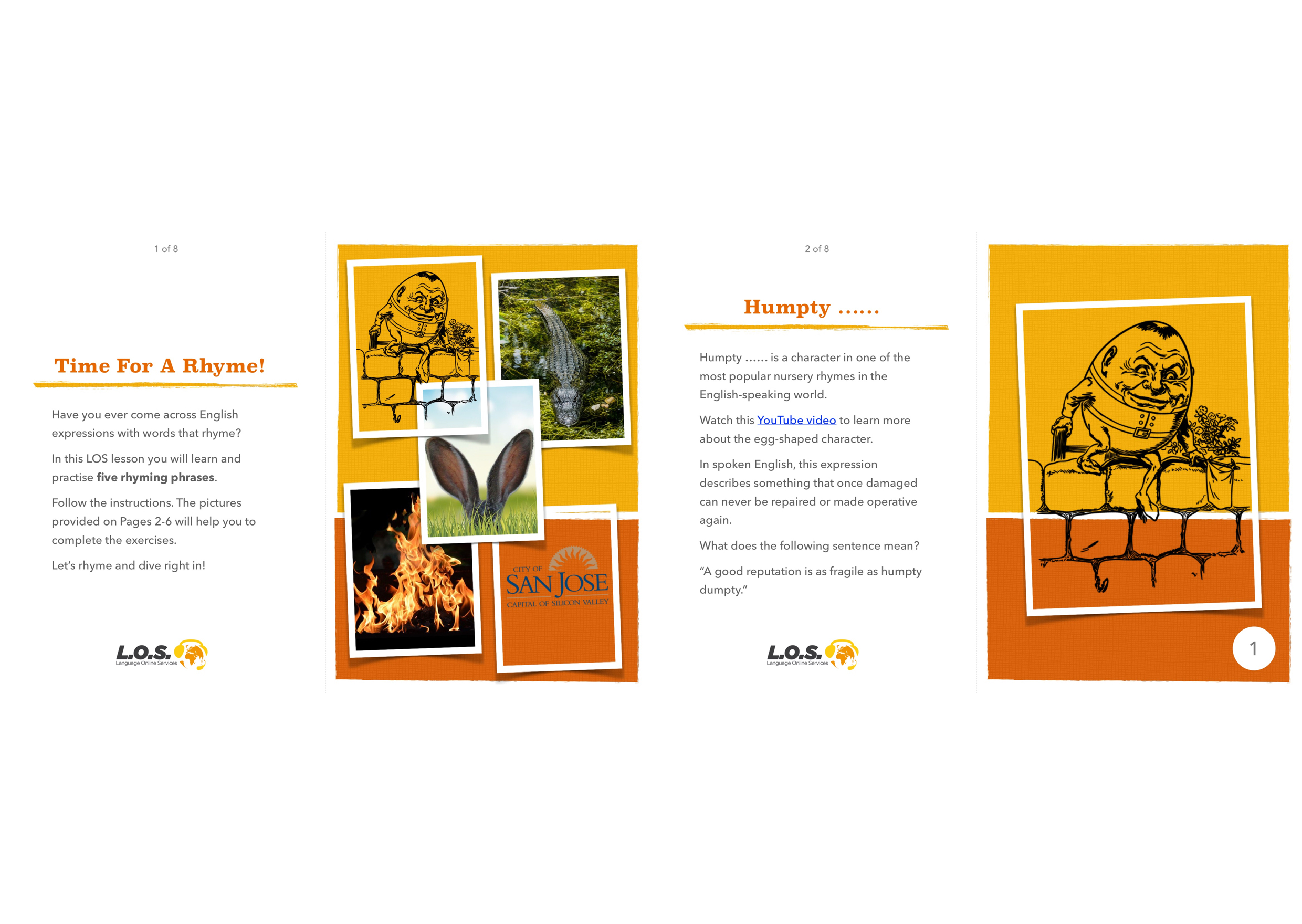I love it when language is playful.
There are a lot of people out there who have this strange idea that we only use language to request and provide information, as if we were robots or members of some sort of cult.
But the truth is that language is used in all sorts of ways. We use it to build relationships (or destroy them), we use it to reinforce power structures (or challenge and subvert them), we use it to mould reality itself and, of course, we just use it for fun. I mean, that’s basically what all standup comedy is about, right?
And, since humans are not much more than big hairless monkeys (with the terrifying and amazing power to transform the world around us), we really like messing around with language.
And what better way to play with the language than rhyming idioms?
See you later, alligator! In a while, crocodile!
Why settle for the traditional “See you later!” when you can spice things up?
Spice things up with man-eating reptiles that is.
Here’s a boring dialogue:
“See you later!”
“Bye.”
Yep. Pretty boring.
But if you add man-eating reptiles, everyone has more fun:
“See you later, alligator!”
“After while, crocodile!”
Please DON’T read this Wikipedia page. It’s terrifying. And that’s just the alligators!
Cheers, big ears!
And why say “thanks,” when you can say “cheers”?
And why say “cheers,” when you can insert a slightly rude, but most likely untrue, observation about your friend’s hearing organs?
No way, Jose!
Wow! You really really don’t want to take the kids to their friend’s birthday party and sit there with loads of other stressed-out parents.
I mean – you really don’t want to go.
So much so that you’re saying “No way!”
So much so that you’ve forgotten who I am and you think I’m Jose.
So you say, “No way, Jose!”

Liar, liar, pants on fire!
Yep! This sounds like a schoolyard thing.
And it kind of is.
When we were kids, we would say this to people who we thought were lying.
Like Katie, who said her dad went to the moon.
Or Omar, who said that he’d met David Hasselhoff at a Care Bears convention.
Or Simon, who said that trickle-down economics actually worked.
Oh, they were good times.
Rhyming idioms to describe things
The world is a complicated and beautiful place.
Sometimes, when we want to describe something, a simple word or short phrase is enough.
But sometimes we need to go the extra mile if we want to not just describe a thing, but also to describe how we feel about it.
Rhyming idioms can really help us paint a picture of something AND express certain feelings about it. Feelings that can usually be quite hard to pin down.
Airy fairy
Have you ever thought about selling your house and travelling the world?
Or starting a revolution by using Instagram?
Or, like one YouTuber I watched once, digging a river across all of Australia to help solve climate change and to bring rainforests back to the continent?
Seriously, this guy.
Well, some people (not me) might suggest that these ideas are all airy fairy — they’re idealistic and foolishly impractical.
Drunk as a skunk
Did you see Barry on Saturday?
It was hysterical. He spent 20 minutes trying to talk to the pub toilet door (he thought he was talking to Kerry), then he kissed a random street cat and jumped into the canal.
Drunk as a skunk!
He really shouldn’t have done that fifth round of shots.
Easy peasy, lemon squeezy!
What’s that?
You want to know the capital of Ethiopia?
Easy-peasy! It’s Addis Ababa!
And the three countries beginning with the letter “R”?
Easy-peasy! Romania, Russia and Rwanda!
And the three countries that are completely landlocked by only one other country
Easy-peasy! It’s Vatican City, San Marino and Lesotho!
As long as it’s geography, then it’s easy.
Easy-peasy.
If you want to extend this idiom, you can even say “Easy-peasy, lemon squeezy.”
If you want.
If you don’t want, then don’t.
Higgledy-piggledy /ˌhɪɡldi ˈpɪɡldi/
I’m currently writing from my parents’ house in Frome, Somerset.
It’s a small town in the southwest of England.
And it almost completely defines higgledy-piggledy.
The streets wind and turn in all sorts of directions — going up, down, left, right, spiralling, reaching dead ends, leading to tiny lanes …
Here’s a photo to explain what I mean.

Hocus-pocus /ˌhəʊkəs ˈpəʊkəs/
Harry Potter!
Gandalf!
That weird man who smelled of whiskey and did magic at my 10th birthday party.
What have they all got in common?
That’s right! Magic! They can all do magic. Except for, perhaps, the whiskey guy.
And another word for magic is hocus-pocus.
But, unlike Harry Potter and Gandalf, most people can’t actually do magic.
So, when we see something that seems impossible …
… like when a salesman makes it look like you’ll actually make money when you buy one of his cars …
… or when your local politician says he’ll give everyone a free puppy when he gets elected
… or when some guy tells you he can teach you English in five weeks with his new “special technique.”
… you know it’s all just not possible, right?
It’s just hocus-pocus.
Doom and gloom
The economy is collapsing!
There’s war everywhere!
Everyone’s fighting online!
It’s all just doom and gloom!
See what I did there?
The bee’s knees and the dog’s bullocks
On the other hand, a lot of things are actually getting better.
Poverty is decreasing.
Fewer people are dying of hunger.
Covid numbers are disappearing.
And there’s this new kind of electric bike that can clean your legs while you cycle.
It’s incredibly good.
In fact, it’s the bee’s knees.
By which I mean it’s one of the best things ever.
You can, for this situation, also use the phrase “the dog’s bollocks.” But be careful with that one. It’s not safe for work.
Rhyming idioms as “truth” and wisdom
For some reason, humans seem to really like it when things rhyme.
But not only do we like it, but we seem to find some sort of wisdom or truth when we hear things rhyme.
I guess that’s why we find so much meaning in songs and poetry.
And rhyming idioms!
Fingers, keepers, losers, weepers
I guess this one kind of promotes unethical behaviour.
And maybe that’s why we like it — as a way to excuse ourselves for keeping that silver Rolex we found on the subway instead of handing it in to the police.
We found it, so we keep it! And if you lost it, then … tough luck!
I mean, come to think of it, this isn’t really very nice at all, is it?
But, then again, that Rolex does look really good on me …
Sticks and stones may break my bones …
This is part of a longer proverb: “Sticks and stones may break my bones, but words will never hurt me.”
It’s the sort of thing you might say to let someone know that what they’re saying doesn’t affect you.
I remember being at school and seeing someone being quite horrible to one of the kids in the playground. That kid replied with “Sticks and stones may break my bones, but words will never hurt me.” Then another kid said, “Well, let’s go get the sticks and stones then!”
I’m ashamed to tell you that I laughed at this.
I mean, it was quite funny.
Use it or lose it!
I use this idiom all the time.
Why?
Well, it’s good advice when it comes to learning a language.
You know how it is.
You spend months and months pushing forward with your English.
You do great! You pick up loads of phrases, you can read more easily and you don’t have to run for the hills when someone starts a conversation with you.
Then you get back to your normal routine and kind of leave your English; no reading, no speaking, no thinking in English … no practice.
Then, when the time comes to use it again, it’s back to how it was!
It’s annoying, right?
And the solution?
The solution is simple.
Use it or lose it!
Rhyming idioms as advice
Unsurprisingly, this whole “rhyming-idiom-as-wisdom” thing has been utilised so much that some rhyming idioms have become proverbs in their own right.
Here are some of the most common ones.
Just relax and go with the flow!
Don’t fight it!
Things might not go the way you planned, but that’s cool.
Relax into it and see where things end up!
By surrendering your plans and expectations and going with the flow, you might end up with a better result after all, right?
Meet-and-greet
Meet-and-greets are organised events for business people and politicians to network, make connections, try to make people like them and … well … they meet people and greet them.
Just imagine a big room with free wine and sandwiches where people mingle and attempt to make themselves more popular.
Name and shame
Here’s an interesting thing that happened in Plovdiv, Bulgaria, the town I’d lived in for a good few years before I moved to Australia in the autumn of 2022.
There was a local Roma guy, Mitko, who went around town every day selling socks.

Mitko was everywhere. If you were sitting in the pub at 10 pm, he’d wander in and see if anyone wants to buy socks.
If you were in the post office waiting to deliver a package, he’d pop in and see if anyone wants to buy socks.
If you were hanging out in the park, he’d be there.
He was the local sock guy. And everyone liked him (and sometimes bought socks off him).
Quite recently a wealthy businessman from Sofia came to Plovdiv and opened some sort of hipster restaurant/cafe/bar thing in town.
One afternoon Mitko came by offering socks to the people sitting at the tables outside.
But the restaurant owner, the rich man from Sofia, wasn’t happy with this and started abusing Mitko, eventually pushing him and headbutting him in the face. Right there. In front of everyone.
Also in front of the restaurant’s CCTV.
You can see it here.
Fortunately, one of the members of staff copied the CCTV footage and put it online.
This led to the whole city coming together to name and shame the rich man from Sofia.
They spread the video online.
The local press released the video and named the man.
Protestors even went outside the restaurant and threw socks at it.
The rich man from Sofia, who punched Mitko in the face was named and shamed.
He had to close down the restaurant (no one was going to eat there anymore) and leave town.
Mitko became a local hero for a while, with some people even chipping in to pay for a billboard by the main road with his face on it.
Man, I love Plovdiv.
Wine and dine
What do traditionally-minded people do when they want to impress a potential romantic partner?
They take them out!
They take them to the best restaurant in town.
They buy the best wine on the menu.
They get one of those amazing post-meal liqueurs for them (and maybe some expensive chocolate).
Yep — for some reason, we’ve all decided that food and booze is the best way to attract a partner in the modern world.
So we wine and dine them.
And there we have it, rhyming idioms!
As you can see, rhyming idioms seem to have a sense of wisdom attached to them.
It’s like the fact they rhyme communicates some sort of universal truth, imparting eternal knowledge through the cosmos from the heavens themselves.
Either that or maybe they’re just fun.
Would you like to zoom in and learn more about some of the phrases featured in this article?
All you need to do is to check out the following DIY lesson.
Let’s rhyme and dive right in!
Gabriel Clark, LOS Consultant & Clark and Miller Co-founder

